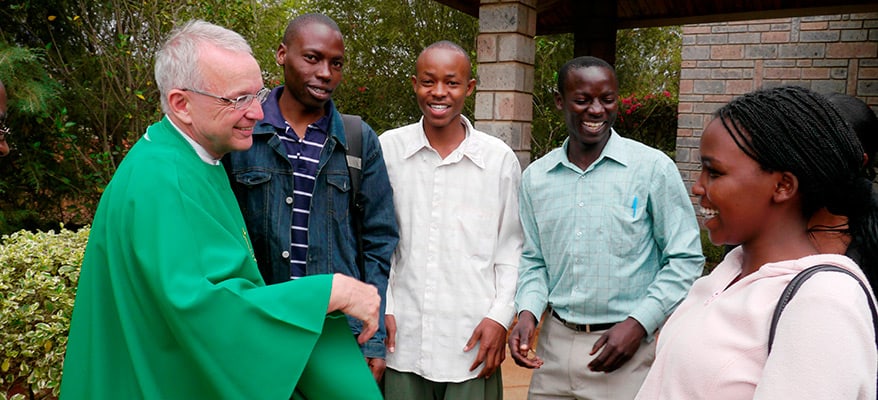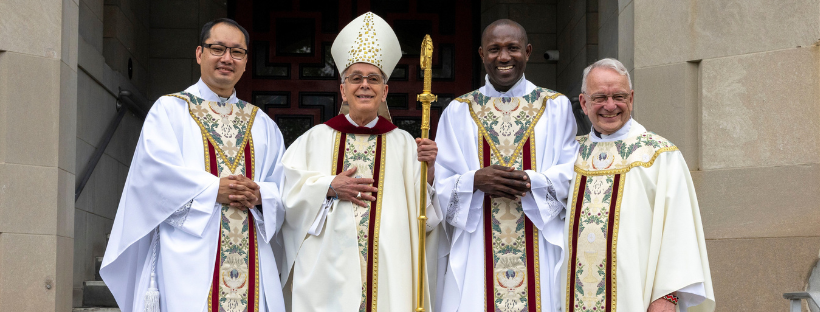2024 Maryknoll
Student Essay Contest WinnersAs part of a reflection activity for the upcoming Jubilee, in response to Pope Francis’s invitation for us to become “pilgrims of hope,” students submitted personal essays. In their writing, each student shared a meaningful personal story where hope played a crucial role in their lives. They described the situation they faced, expressed the emotions they experienced during that time, and identified the source of their hope—whether it came from faith, family, friends, or inner strength. The students also reflected on how the experience changed them and what they learned about the power and importance of hope in difficult moments.
DIVISION I (Grades 6-8)
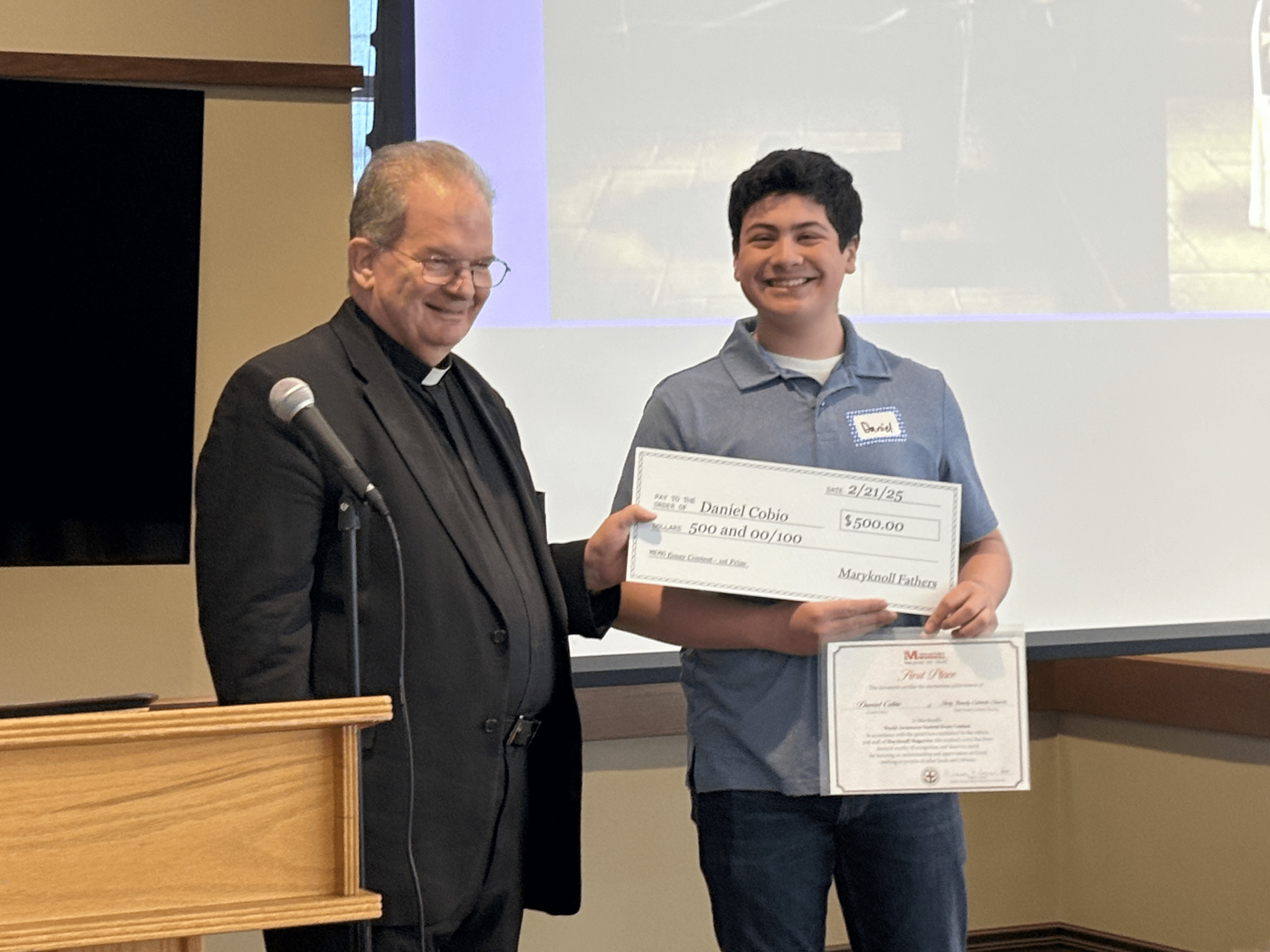
A Ray of Hope
1st Place Winner – Daniel Cobio, Grade 8
Holy Family Catholic Church – Rockford, IL
When I was a little boy, I read a story about a lighthouse. In this story, a little lighthouse emitted an intense light that shined bright in the dark night. Sailors in a ship were saved from getting lost at sea while navigating treacherous waters because they followed this light. I truly believe that hope is a light that gets us through our darkest moments in life. Although I am only 14 years old, I can recall a time of darkness and worry that consumed my existence. This occurred four years ago during COVID.
One morning, I woke up as usual and started getting ready for school. I was excited to go and see my friends since I had not seen them for a week due to spring break. My mother came into my room and told me that I wouldn’t be going to school because everything was being shut down due to people getting sick. I was confused at first and soon became scared. To me, if people got sick, they would go to the doctor. We didn’t close buildings and make people stay home.
Soon, only my father would go get groceries and no one else would be allowed out of the house. My mother would wipe down with bleach wipes everything that came into the house. I had never seen this before and I wondered if we, too, could get sick and die. At one point, I accidentally heard that many people were dying around the world and there was no cure. I was terrified and had nightmares every night.
Days, weeks, and months went by with no end to this chaos in sight. I would spend my days inside the house doing my homework online. Those were very stressful times. The saddest time came when I went with my mother to check on my grandparents. We could only see them through the window, and it was devastating to not be able to hug them. I can still remember the tears that rolled down their cheeks as they waved to us from across the glass. That image will be engraved in my heart forever.
One particular afternoon, I remember feeling a deep sadness in my heart. To me, nothing would ever be the same again and things would not get better. I sat on the window ledge in our dining room, looking outside to the sky asking God for a sign. I’ve always believed that God talks to us by sending us signs. We just need to talk to him, and he answers. Well, this afternoon, as I looked up to the grayish clouds, I asked God if things would ever get better. Would we ever return to a more normal existence?
It was at that moment I saw the brightest ray of sunshine pierce through the clouds. I knew that God was sending me a sign. He was saying that everything would be alright. To me, that bright light was a ray of hope.
After that day, I knew in my heart that things would be fine. The hope that I felt helped me get through the toughest days. Hope was like candlelight that shines bright in the darkest night. It fueled my soul and gave me the courage to stay strong. Little by little, things did get better, and we slowly started getting back to a more normal life.
From this experience, I have learned that hope is powerful. Hope is God. It is a force that lifts our spirits and gets us through the toughest times. It is not only important to have hope, but it is also equally essential to be a beacon of hope for others. There is so much suffering going on in the world, and people face a variety of challenges every day. One can be that light that brings hope and pulls someone out of despair. I, too, can be a lighthouse that shines a light of hope and makes a difference in the world.
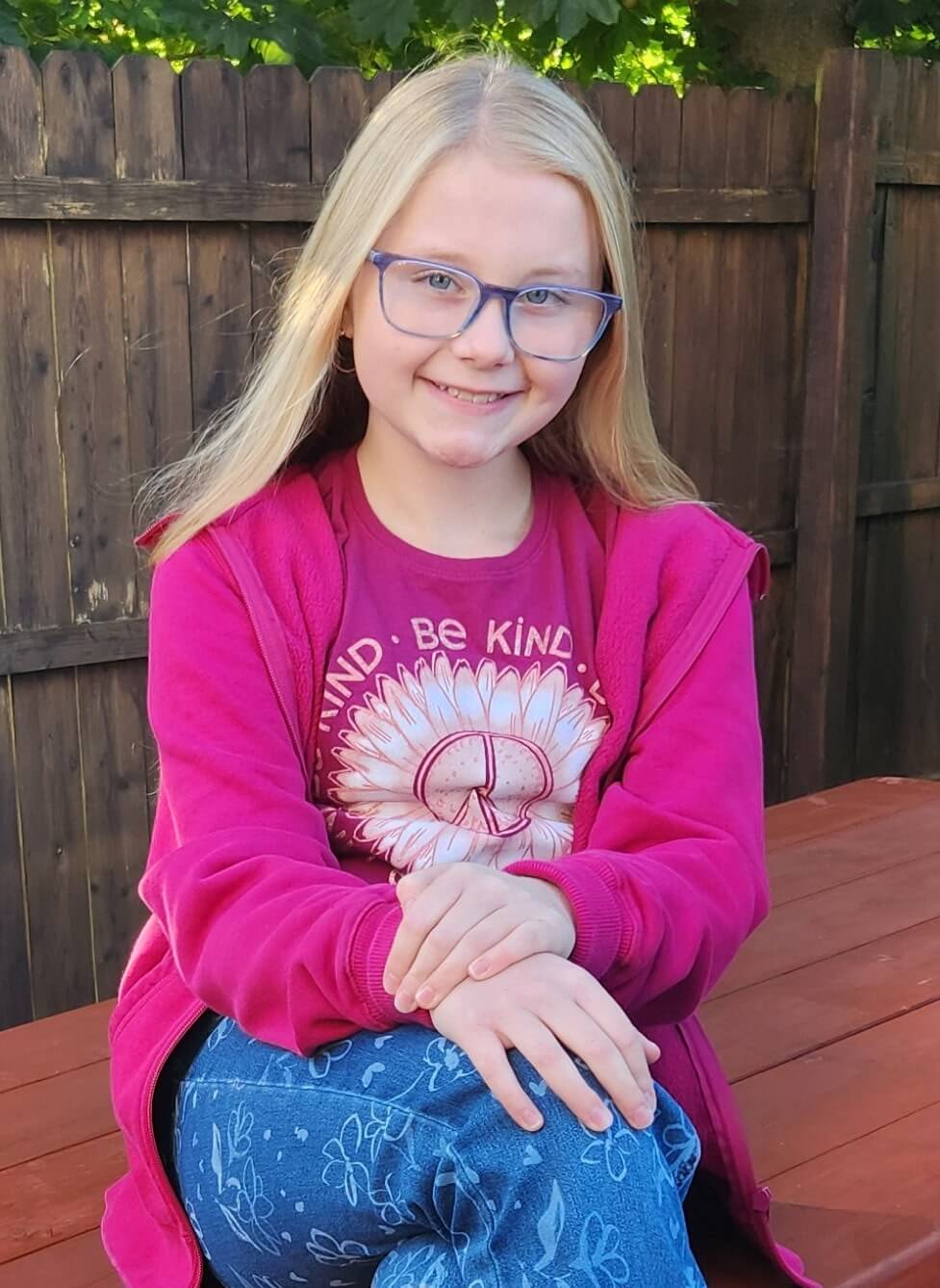
Jesus, I Hope in You!
Gwendolyn Eisley, Grade 7
St. Luke Parish, Jersey Shore, PA
This summer, in July, I was diagnosed with Crohn’s Disease. I had experienced many symptoms over the previous 18 months, and it took a long time to get a diagnosis. My family and I were upset. We didn’t know why I developed the disease. My doctor told us that I should start getting treated with infusions every six weeks. The medicine that I am treated with makes me immunocompromised. Because of my immunocompromised state, I have to be homeschooled to limit my interaction with extra germs. It’s not always fun to miss out on “normal” childhood activities. I am still only 11 years old. It is not easy to live with a chronic illness that doctors say will never go away. I really have to hope in Jesus!
I have always tried to be hopeful in life, but now I need to try harder than ever. Prayer helps us to be more hopeful. My mom quit her job to take care of me, among other things, so she is mainly the one that takes me to my doctor’s appointments and infusions that are four hours away from where we live. We pray in the car on the way to my appointments and on the way back. My dad, who is a deacon, blesses me with holy water or holy oil before bed. My parents pray with me, especially when the suffering is difficult. When my family prays at home or at church, we ask the Lord to heal my stomach so that I can feel better and live a more normal teenage and adult life, if it is His will. I stopped keeping secrets about the Crohn’s disease. There is also a chance that I have juvenile arthritis as well. My body hurts most of the time. I’ll be tested for arthritis soon. My parents’ true hope is that my Crohn’s might go into remission, and that I’ll have much less pain soon, and that I might grow to be a healthy adult. However, only if God wills it. I have learned to hope in God’s will.
The knowledge that God loves me and that he will help me to deal with my suffering is very comforting. I understand that God didn’t cast this disease upon me, but he did let it happen. The reason for it, I am not sure, but I really have to place my trust in His plan.
Because this disease and its treatments impact me heavily, I cannot do big things, and I’ve had to give up a lot. I like to try to follow St. Therese of Lisieux’s Little Way. Even though she was little and weak, she did not give up hope that she would someday get to Heaven. She is a very good reminder to me that I shouldn’t stop hoping, and she had very imperfect tendencies as a little girl, like I do. That gives me hope that I can grow spiritually in my own suffering as she did, and pray for others even though I cannot do a lot because of my poor health. Right now, I am in Confirmation classes, and I’m considering St. Therese of Lisieux as my patron saint for Confirmation.
During the start of the Covid pandemic, my family began to pray the Chaplet of Divine Mercy together daily in addition to the Rosary. We add the prayer, “Jesus, I trust in You,” at the end of the Chaplet. I also know that in the Rosary, the 3 Hail Mary’s at the beginning are for an increase in Faith, Hope, and Love/Charity. I don’t think that enough people realize the importance of praying for an increase in hope. We all need more hope and more Jesus! Hoping can create a positive mindset about a not-so-positive situation, and I’m sure that Jesus loves when we place our hope and trust in Him. It is my hope, that if I am granted a prize in this contest, I can become a “pilgrim of hope,” for others as Pope Francis asks, by donating half of the winnings to the Crohn’s and Colitis Foundation. I know that a lot of children are suffering more than I am. Perhaps with my prayers for them, and a little donation, it might bring hope to others.
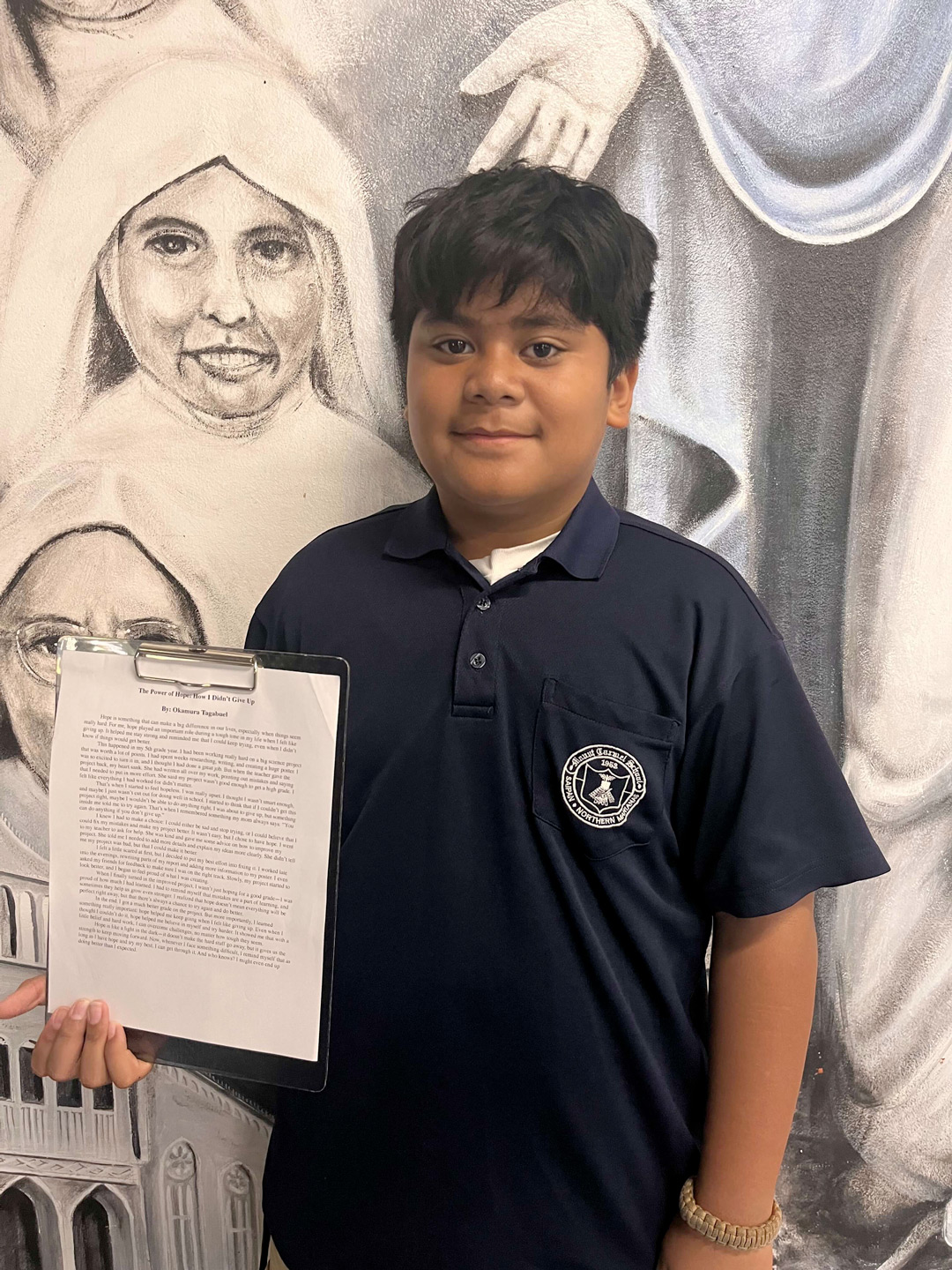
The Power of Hope: How I Didn’t Give Up
Okamura Tagabuel, Grade 6
Mt. Carmel School Saipan, Northern Mariana Island, U.S. Territory
Hope is something that can make a big difference in our lives, especially when things seem really hard. For me, hope played an important role during a tough time in my life when I felt like giving up. It helped me stay strong and reminded me that I could keep trying, even when I didn’t know if things would get better.
This happened in my 5th grade year. I had been working really hard on a big science project that was worth a lot of points. I had spent weeks researching, writing, and creating a huge poster. I was so excited to turn it in, and I thought I had done a great job. But when the teacher gave the project back, my heart sank. She had written all over my work, pointing out mistakes and saying that I needed to put in more effort. She said my project wasn’t good enough to get a high grade. I felt like everything I had worked for didn’t matter.
That’s when I started to feel hopeless. I was really upset. I thought I wasn’t smart enough, and maybe I just wasn’t cut out for doing well in school. I started to think that if I couldn’t get this project right, maybe I wouldn’t be able to do anything right. I was about to give up, but something inside me told me to try again. That’s when I remembered something my mom always says: “You can do anything if you don’t give up.”
I knew I had to make a choice: I could either be sad and stop trying, or I could believe that I could fix my mistakes and make my project better. It wasn’t easy, but I chose to have hope. I went to my teacher to ask for help. She was kind and gave me advice on how to improve my project. She told me I needed to add more research and be more careful. She didn’t tell me my project was bad, but that I could make it better.
I felt a little scared at first, but I decided to put my best effort into fixing it. I worked late into the evenings, rewriting parts of my report and adding more information to my poster. I even asked my friends for feedback to make sure I was on the right track. Slowly, my project started to look better, and I began to feel proud of what I was creating.
When I finally turned in the improved project, I wasn’t just hoping for a good grade—I was proud of how much I had learned. I had to remind myself that mistakes are a part of learning, and sometimes they help us grow even stronger. I realized that hope doesn’t mean everything will be perfect right away, but that there’s always a chance to try again and do better.
In the end, I got a much better grade on the project. But more importantly, I learned something really important: hope helped me keep going when I felt like giving up. Even when I thought I couldn’t do it, hope helped me believe in myself and try harder. It showed me that with a little belief and hard work, I can overcome challenges, no matter how tough they seem.
Hope is like a light in the dark—it doesn’t make the hard stuff go away, but it gives us the strength to keep moving forward. Now, whenever I face something difficult, I remind myself that as long as I have hope and try my best, I can get through it. And who knows? I might even end up doing better than I expected.
DIVISION II (Grades 9-12)
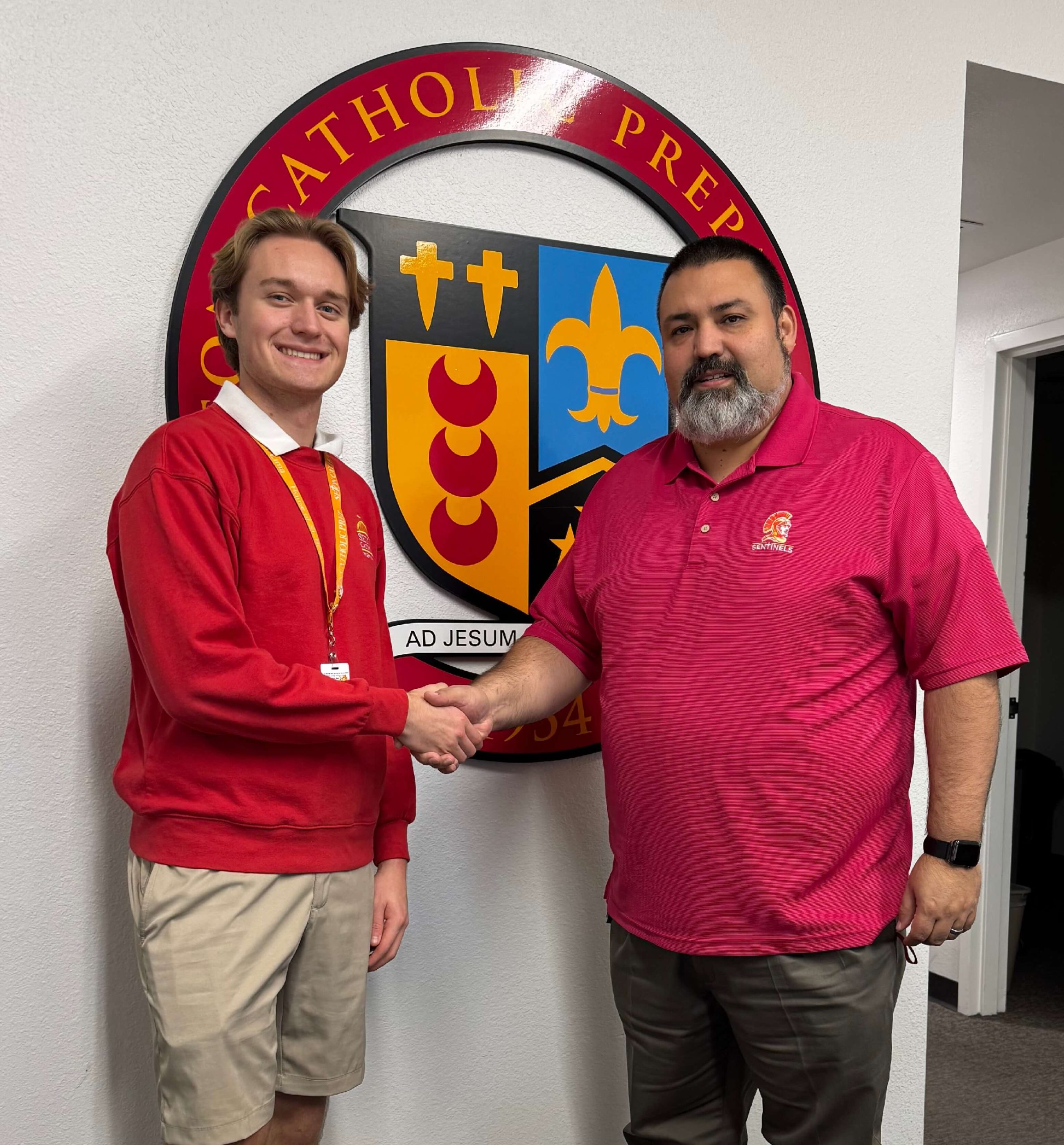
A Beautiful Plan
Cole Urwiller, Grade 12
Seton Catholic Preparatory School – Chandler, AZ
I learned about hope at a very young age. When I was 7 years old, my family was expecting our fourth child. We were all so excited watching my mom’s belly grow and feeling the baby kick as we lay our heads on her stomach while she read to us every night before bed.
Our excitement turned to sadness, though, when my mom came home from the doctor one day in tears. She shared with us that our baby brother had gone to heaven to be with Jesus. I remember holding his little body in my arms at the hospital after she delivered him, his perfect little fingers and toes, so wonderfully made. And I remember standing by his little coffin at the cemetery singing “Jesus Loves Me” with my siblings.
Jesuit Father Michael Sparough once said, “Ultimate hope is accepting what is beyond our control and believing that God will use the circumstances of our lives to help us grow in holiness.” And that is just what my family did. We trusted in the Lord’s plan for us through our sadness and grief, we stayed strong in our faith, and we never lost our hope.
Two years later, my parents gathered us all together for a family meeting and shared the exciting news that we were expecting another baby. Our excitement turned to shock when the ultrasound showed not one baby, but two … we were going to have identical twin girls! The Lord answered our faithful prayers with two babies.
Things took a sudden turn, however, when our twins were diagnosed with twin-to-twin transfusion syndrome (TTTS), which happens when identical twins sharing one placenta begin to have an imbalance in nutrients. One twin was receiving nearly all the nutrients. The doctors monitored the twins closely, hoping the condition would level out and the babies would each get the nutrients they needed. Meanwhile, we prayed and stayed faithful in hope.News of our babies spread throughout our church, our diocese and the world. They were lifted up in prayer by so many faithful prayer warriors, blessing our family with so much hope. Their TTTS, however, continued to progress, so my parents flew to Houston, Texas, to see a specialist. It was decided that surgery was needed to give the twins the best chance at survival.
Along with all our faithful prayer warriors, we covered the surgeon and medical team in prayer as they operated inside the amniotic sac with the twins, closing off the connecting blood vessels in the placenta so that each baby would have their own source of nutrients. We knew it was a high-risk procedure, but we trusted in the Lord and had hope.
Eight weeks later, my little twin sisters made an early arrival at 34 weeks. My parents shared with us that the delivery room was packed full of specialists, expecting to have to administer blood transfusions and other medical interventions for the babies. Much to the doctors’ surprise, my sisters came out of the womb perfectly healthy with loud, joyous cries. There was a collective pause and sense of wonder in the delivery room as everyone took in the perfectly healthy little babies with complete awe. From that day on, my twin sisters have been known as “the miracle twins” they truly are.
Through the lives of my brother in heaven and my miracle twin sisters here on earth, I have learned the importance of hope. Hope is what carried my family through our time of grief after losing my little brother. Hope is what gave us the strength to not give into fear and despair during my twin sisters’ struggle with TTTS. And hope is what makes each moment of every day worth living.
The Oxford Dictionary describes hope as “a feeling of expectation and desire for a certain thing to happen, a feeling of trust.” And to me, that is what hope is all about — trust. Trusting that the Lord has a beautiful plan for our lives and that everything that happens is a part of his beautiful plan. “Never, ever give up on hope. Never doubt, never tire, and never become discouraged. Be not afraid!” — St. John Paul II

Hope is a cornerstone in my life
Galen Belmar, Grade 10
St. John’s Catholic Preparatory School, Buckeystown, MD
Hope is a cornerstone in my life, a simple yet powerful force guiding me through challenges. One of the most profound moments when hope played an essential role was during a service trip to Jamaica with RetailROI. The trip, filled with uncertainty and humility, shaped my understanding of hope as not just an expectation of good but as a force that transforms lives.
The trip to Jamaica was my first significant venture into the unknown. It was my first trip outside of the country, and I was unsure exactly what we would be doing. We were tasked with painting an elementary school and organizing a celebration for the children at the end of the week, along with some other smaller things throughout the week. While these responsibilities seemed straightforward, the context in which we worked was anything but simple. Many of the children we encountered faced economic hardship and limited access to basic resources. Their smiles, though bright, often hid stories of struggle. I remember questioning how our small efforts could possibly make a meaningful impact in their lives. However, as the trip continued, I began to see hope living in the heart of the community. It started in the simplest of moments when a young child in elementary school excitedly grabbed my hand and asked if she could show me around their school. During the tour of their small, but vibrant school community, I began to see that hope was not something distant or unreachable. It lived in the connections between people and the joy we created together.
What gave me hope was the determination of the children, and their belief in the promises of tomorrow despite their hardships. They saw possibility in every act of kindness, every bright stroke of paint applied to their school building, and every laugh-filled moment. Their hope was almost contagious, reminding me that even small actions can cascade outward and create profound change.
On the final day of our trip, we hosted a celebration for the students, complete with games, music, and food. Watching their eyes light up as they danced and played, I realized that hope does not require solving every problem. Sometimes, it’s about being present in the moment, offering support and care, and planting seeds of joy that can grow into something greater. In those moments, I felt hope not as a goal, but as an active force that inspires everyone.
This experience in Jamaica changed me deeply. It taught me that hope is not reserved for perfect solutions or special actions. Instead, it lives in the small, intentional actions we take to show love and compassion. I learned that hope is both a gift and a responsibility. It pushes us to look beyond ourselves and into the lives of others, to see the possibilities of the future, even during times of struggle.
Since returning from Jamaica, I have carried this lesson into every part of my life. Whether as a sacristan at my parish, a student balancing academics and athletics, or a peer minister guiding others through their Confirmation faith journeys, I desire to be a beacon of hope. I have learned that hope is not just for those in need but also for those who give. Hope is a shared journey, one that unites us in our humanity and connects us to something greater. As St. Augustine said, “Hope has two beautiful daughters—anger and courage. Anger at the way things are, and courage to see that they do not remain as they are.” My time in Jamaica showed me both a frustration at the hardships faced by others and a bold determination to bring hope into their lives. This balance of emotions continues to inspire me to serve with compassion and purpose.
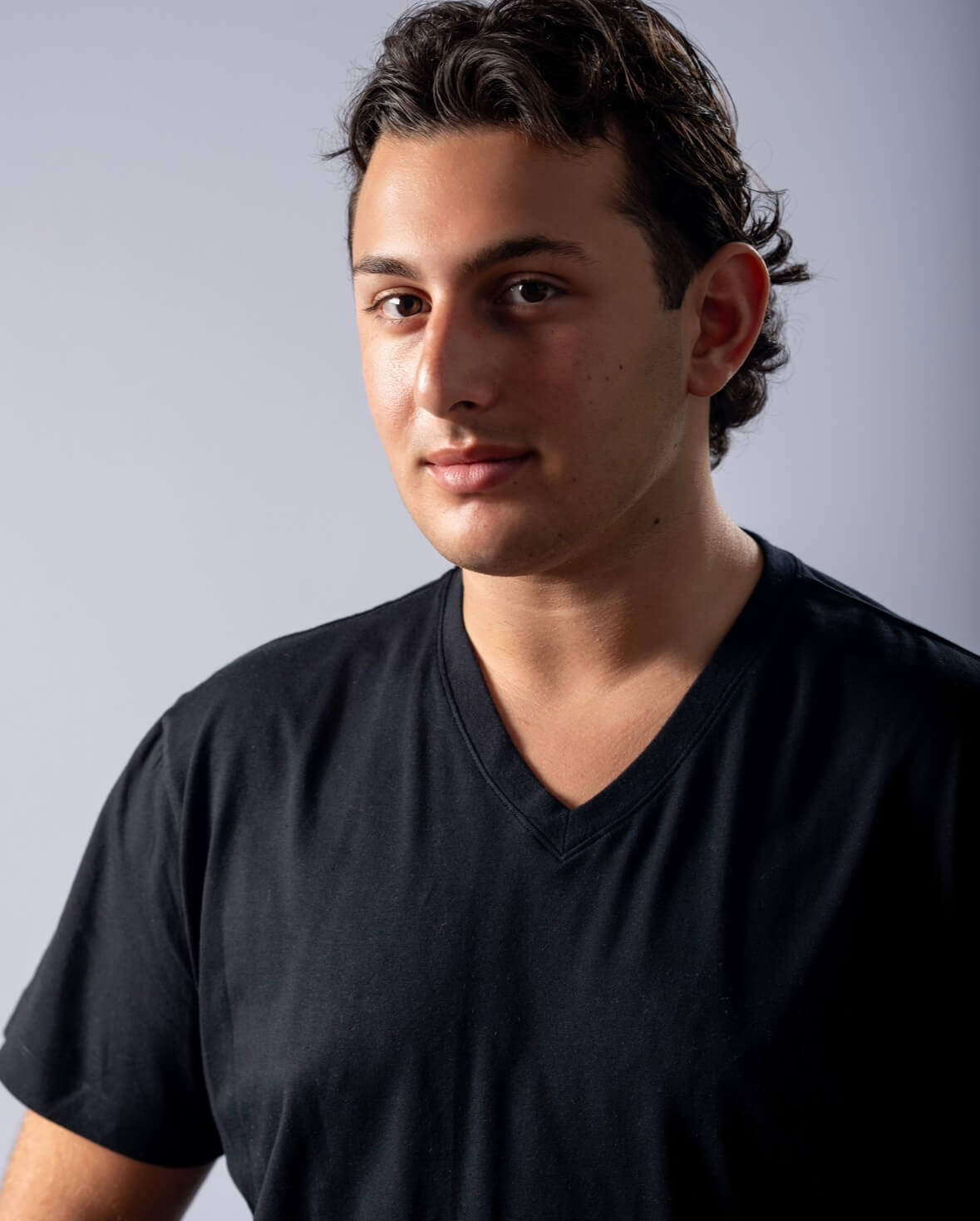
Pilgrims of Hope
3rd Place Winner – George Sercan
St. Augustine Catholic High School – Markham, Ontario, Canada
The 2025 Jubilee is centered on the theme “Pilgrims of Hope.” As His Holiness Pope Francis so beautifully expressed it: “We must fan the flame of hope that has been given to us and help everyone to gain new strength and certainty by looking to the future with an open spirit, a trusting heart and far-sighted vision.” During the COVID-19 pandemic, I came face-to-face with the true power of hope, an experience that transformed my understanding of strength and resilience. When the pandemic struck, my family was hit with uncertainty and fear. In September of 2021, my father contracted a severe case of COVID and fell gravely ill. His condition worsened quickly, and within days, doctors informed us that they had to place him in a medically induced coma to give his body a fighting chance. For the next 30 days, my father lay in a coma, his life hinging on each breath as he fought an unseen battle. During this time, hope became our lifeline, and we became “pilgrims of hope,” leaning on our faith and optimism, fanning the flame that kept us moving forward in what felt like endless darkness.
When I learned about my father’s condition, I was struck with shock and fear; him being unconscious, away from us, fighting a silent struggle, was incredibly painful. The heart of our family—my role model, the person who taught me the value of kindness, resilience, and love, the fear of losing him felt like a weight too heavy to bear, yet we had no choice but to wait and hope. The days stretched into weeks; I realized that hope could be a guiding life force – a choice we make even when the odds are uncertain. I began to channel a source where I recorded memories and all the things I was grateful for. My spiritual hope helped me visualize a future: my family was gathered around the dinner table again and I could hear my father’s voice and laughter as he shared stories. Every time I pictured these moments, my spirit felt a little lighter, and my hope grew stronger. Slowly, I realized that by choosing to hope, I was able to bring light into our lives and help us survive the darkest moments. Pope Francis’ words resonated deeply with me; my family and I clung to hope because it is all we had, and holding onto it was the only way to face each day with strength.
In those early days, there were moments when my hope wavered, but my family and our community helped me stay grounded. My mother reminded me that the doctors were doing everything possible and that my father was strong. I received encouraging messages from friends and family, many of whom shared stories of loved ones who had fought and recovered. Despite the physical distance created by the pandemic, our community wrapped around us like a warm embrace, reminding us that we were not alone. This support was a powerful source of hope. We prayed daily as a family to God and different saints.
Finally, after a month in the coma, my father began to show signs of improvement. The day he regained consciousness felt like a miracle, and, in that moment, I understood the true power of hope. He was the only one of five people in the hospital at the time who survived. Hope carried us through even when we didn’t know what the future held in the darkest of times. My father’s recovery required physical and speech therapy and was not only a testament to modern medicine but to the strength of the human spirit and the faith we placed in him.
This experience has profoundly changed me. I learned that hope is not merely a wish but a guiding force that allows us to confront fear and uncertainty with courage. Pope Francis’ pilgrims of hope resonate with me because I learned that hope does not erase difficulty but gives us the courage to face it, finding purpose and growth in the process. Hope has transformed my perspective, allowing me to approach life with an open heart, a trusting spirit, and the strength to face challenges head on. This experience taught me that while we may not have control over the challenges we face, we do have control over how we respond. Hope, I have come to realize, is not just for ourselves—it is something we share, igniting it in others, creating a cycle of strength and resilience that sustains us all.


